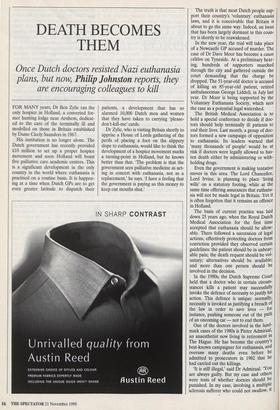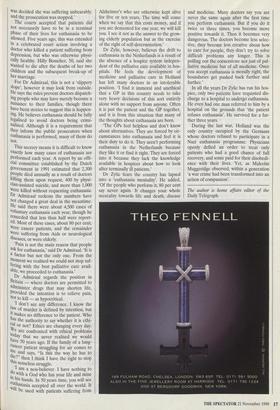DEATH BECOMES THEM
Once Dutch doctors resisted Nazi euthanasia are encouraging colleagues to kill
FOR MANY years, Dr Ben Zylic ran the only hospice in Holland, a converted for- mer hunting lodge near Arnhem, dedicat- ed to the care of the terminally ill and modelled on those in Britain established by Dame Cicely Saunders in 1967.
His institution is no longer alone. The Dutch government has recently provided £10 million to set up a proper hospice movement and soon Holland will boast five palliative care academic centres. This is a significant development in the only country in the world where euthanasia is practised on a routine basis. It is happen- ing at a time when Dutch GPs are to get even greater latitude to dispatch their patients, a development that has so alarmed 10,000 Dutch men and women that they have taken to carrying 'please- don't-kill-me' cards.
Dr Zylic, who is visiting Britain shortly to apprise a House of Lords gathering of the perils of placing a foot on the slippery slope to euthanasia, would like to think the development of a hospice movement marks a turning-point in Holland, but he knows better than that. 'The problem is that the government sees palliative medicine as act- ing in concert with euthanasia, not as a replacement,' he says. 'I have a feeling that the government is paying us this money to keep our mouths shut.' The truth is that most Dutch people sup- port their country's 'voluntary' euthanasia laws, and it is conceivable that Britain is about to go the same way. Indeed, an issue that has been largely dormant in this coun- try is shortly to be reawakened.
In the new year, the trial will take place of a Newcastle GP accused of murder. The case of Dr Dave Moor has become a cause célèbre on Tyneside. At a preliminary hear- ing, hundreds of supporters marched through the city and gathered outside the court demanding that the charge be dropped. The 51-year-old doctor is accused of killing an 85-year-old patient, retired ambulanceman George Liddell, in July last year. Dr Moor is being supported by the Voluntary Euthanasia Society, which sees the case as a potential legal watershed.
The British Medical Association is to hold a special conference to decide if doc- tors should help terminally ill patients to end their lives. Last month, a group of doc- tors formed a new campaign of opposition to euthanasia. Its leaders warned that `many thousands of people' would be at risk if doctors were legally allowed to has- ten death either by administering or with- holding drugs.
Even the government is making tentative moves in this area. The Lord Chancellor, Lord Irvine, is planning to place 'living wills' on a statutory footing, while at the same time offering assurances that euthana- sia will not be made legal in Britain. Yet it is often forgotten that it remains an offence in Holland.
The basis of current practice was laid down 25 years ago, when the Royal Dutch Medical Association for the first time accepted that euthanasia should be allow- able. There followed a succession of legal actions, effectively protecting doctors from conviction provided they observed certain guidelines: the patient should be in unbear- able pain; the death request should be vol- untary; alternatives should be available; and more than one person should be involved in the decision.
In the 1980s, the Dutch Supreme Court held that a doctor who in certain circum- stances kills a patient may successfully invoke the defence of necessity to justify his action. This defence is unique: normally, necessity is invoked as justifying a breach of the law in order to save lives — for instance, pushing someone out of the path of an oncoming car — not to end them. One of the doctors involved in the land- mark cases of the 1980s is Pieter Admiraal, an anaesthetist now living in retirement in The Hague. He has become the country's best-known campaigner for euthanasia, and oversaw many deaths even before he admitted to prosecutors in 1982 that he had carried out the killings. `It is still illegal,' said Dr Admiraal. 'You are always guilty. But my case and others were tests of whether doctors should be punished. In my case, involving a multiple sclerosis sufferer who could not swallow, it was decided she was suffering unbearably, and the prosecution was stopped.' The courts accepted that patients did not necessarily have to be in a terminal phase of their lives for euthanasia to be allowed. Five years ago, this was extended in a celebrated court action involving a doctor who killed a patient suffering from depression, but who was otherwise physi- cally healthy. Hilly Bosscher, 50, said she wanted to die after the deaths of her two children and the subsequent break-up of her marriage. For Dr Admiraal, this is not a 'slippery slope', however it may look from outside. He says the rules prevent doctors dispatch- ing people who may have merely become a nuisance to their families, though there have been stories to suggest this is happen- ing. He believes euthanasia should be fully legalised to avoid doctors being crimi- nalised. Although it is a requirement that they inform the public prosecutors when euthanasia is performed, many of them do not.
This secrecy means it is difficult to know exactly how many cases of euthanasia are Performed each year. A report by an offi- cial committee established by the Dutch government in 1991 estimated that 2,300 people died annually as a result of doctors killing them upon request, 400 by physi- cian-assisted suicide, and more than 1,000 were killed without requesting euthanasia. Dr Admiraal reckons the numbers have not changed a great deal in the meantime. He said there were about 4,500 cases of voluntary euthanasia each year, though he conceded that less than half were report- ed. Most of these cases, about 80 per cent, were cancer patients, and the remainder were suffering from Aids or neurological diseases, or were elderly. `Pain is not the main reason that people ask for euthanasia,' said Dr Admiraal. 'It is a factor but not the only one. From the moment we realised we could not stop suf- fering with the best palliative care avail- able, we proceeded to euthanasia.' Dr Admiraal regards the position in Britain — where doctors are permitted to administer drugs that may shorten life, Provided the intention is to relieve pain, not to kill — as hypocritical. `I don't see any difference. I know the law of murder is defined by intention, but it makes no difference to the patient. Who has the authority to say whether it is ethi- cal or not? Ethics are changing every day. We are confronted with ethical problems today that we never realised we would have 50 years ago. If the family of a lung- cancer patient struggling for air comes to 111e and says, "Is this the way he has to die?" then I think I have the right to stop this senseless struggle. I am a non-believer. I have nothing to do with a God who has your life and mine in his hands. In 50 years time, you will see euthanasia accepted all over the world. It will be used with patients suffering from Alzheimer's who are otherwise kept alive for five or ten years. The time will come when we say that this costs money, and if you are demented for one year, we will kill you. I see it not as the answer to the grow- ing elderly population but as the exercise of the right of self-determination.'
Dr Zylic, however, believes the drift to euthanasia in the Netherlands is a result of the absence of a hospice system indepen- dent of the palliative care available in hos- pitals. He feels the development of medicine and palliative care in Holland has left many doctors in an intolerable position. 'I find it immoral and unethical that a GP in this country needs to take very heavy decisions of this sort entirely alone with no support from anyone. Often it is just the patient and the GP together, and it is from this situation that many of the thoughts about euthanasia are born.
`The GPs feel helpless and don't know about alternatives. They are forced by cir- cumstances into euthanasia and feel it is their duty to do it. They aren't performing euthanasia in the Netherlands because they like it or find it right. They are forced into it because they lack the knowledge available in hospices about how to look after terminally ill patients.'
Dr Zylic fears the country has lapsed into a 'euthanasia mentality'. He added, `Of the people who perform it, 80 per cent say never again. It changes your whole mentality towards life and death, disease and medicine. Many doctors say you are never the same again after the first time you perform euthanasia. But if you do it twice or three times, you become more positive towards it. Then it becomes very dangerous. The doctors become less selec- tive, they become less creative about how to care for people, they don't try to solve difficult problems any longer. This is pulling out the cornerstone not just of pal- liative medicine but of all medicine. Once you accept euthanasia is morally right, the boundaries get pushed back further and further.'
In all the years Dr Zylic has run his hos- pice, only two patients have requested dis- charge to a hospital to undergo euthanasia. He even had one man referred to him by a hospital on the grounds that 'the patient refuses euthanasia'. He survived for a fur- ther three years.
During the last war, Holland was the only country occupied by the Germans whose doctors refused to participate in a Nazi euthanasia programme. Physicians openly defied an order to treat only patients who had a good chance of full recovery, and some paid for their disobedi- ence with their lives. Yet, as Malcolm Muggeridge observed, within a generation `a war crime had been transformed into an action of compassion'.
The author is home affairs editor of the Daily Telegraph.



















































































 Previous page
Previous page